Fibre Aramid Flexible Packaging 26-10-2021 - Arhive
Fibre Aramid Flexible Packaging
Crude Oil Prices Trend

-Indorama Ventures presents sustainable fibre solutions
Six brands uniquely positioned to meet the challenging market demand for sustainable solutions within the hygiene sector.
The Indorama Ventures (IVL) Hygiene Fibers Group presented an extensive range of recycled and biodegradable fibre solutions for nonwovens at last week’s INDEX show (October 19-22) in Geneva.
The combination of polymers, technologies, processes and global reach supported by the group – one of three business segments that make up IVL – uniquely positions it to meet the challenging market demand for sustainable solutions within the hygiene sector.
Across the six brands and companies that make up Hygiene Fibers Group – Auriga, Avgol, FiberVisions, Indorama Asia, Trevira and Wellman International – sustainability and supporting customers to achieve circular objectives is now paramount.
At INDEX, the group launched CiCLO, a textile technology which enables polyester and other synthetic materials to biodegrade like natural materials do in wastewater treatment plant sludge, sea water and landfill conditions, reducing synthetic microfibre pollution generated during washing, and minimising plastic accumulation in landfills caused by discarded textiles.
Aurifa, Trevira and Wellman have been working closely with the CiCLO technology over the past 12 months, with a focus on sustainable PET and rPET staple fibre and filament solutions in areas where recycling is particularly challenging, such as hygiene, home textiles and automotive applications.
Trevira also introduced a new range of bicomponent fibres based on PLA and PBS (polybutylene succinate). Both biopolymers offer an exceptional technological opportunity in terms of environmental care and sustainability, while delivering optimum performance. Like PLA, PBS is recyclable and up to 100% biodegradable under industrial conditions.
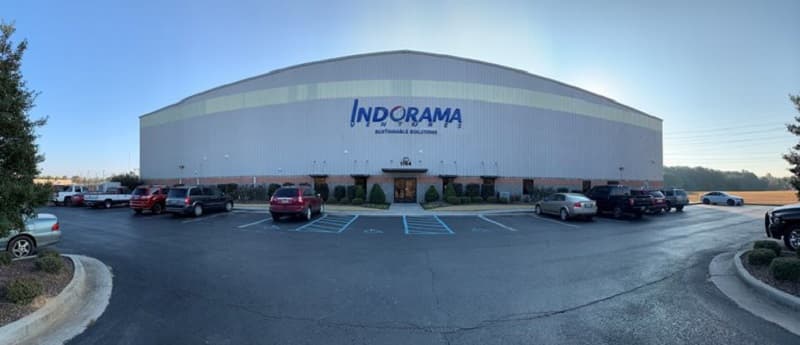
-Fitesa to install new Reicofil 5 in Europe
Investment will contribute to changing the sustainability profile of the spunmelt nonwovens industry.
At last week’s INDEX nonwovens show in Geneva (October 19-22), Fitesa announced that it will install a new multibeam Reicofil 5 spunmelt line in Europe, with start-up planned for the second quarter of 2023.
The new machine will be installed at one of Fitesa’s current facilities in the region and will be equipped to produce full high loft and standard spunmelt products, using a variety of sustainable raw materials including bioPE and PLA.
“This line will be a state-of-the art machine capable of serving the growing demand for sustainable spunmelt products,”, said Michael Baumgartner, Fitesa’s senior vice-president for Europe and China. “Once the machine is online, we will ramp up production from our pilot lines which significantly increases our ability to supply the market with softer products and increased circular and green content produced locally in Europe.”
“This investment will contribute to changing the sustainability profile of the spunmelt nonwovens industry,” added Fernanda Gastal, Fitesa’s vice-president of procurement and marketing. “It is one of three areas where we believe we can make a significant impact – innovative technology offering, environmentally friendly raw materials and the reduction of greenhouse gas emissions in our operations”. Fibre Aramid Flexible Packaging
Fitesa has been producing nonwovens from biobased polymers since the early 2010s, including 100% biobased spunbond materials.
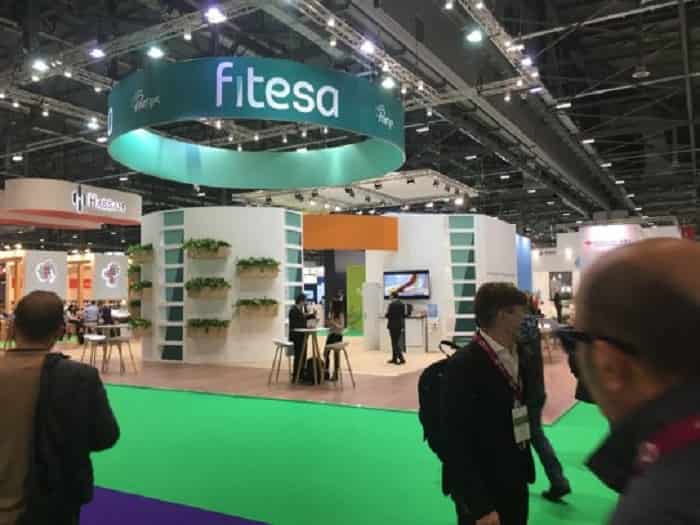
-Switzerland Retail Company Producing PET Bottles Made from Recycled Carbon
The company used technology developed by LanzaTech in Chicago.
LanzaTech announced that Switzerland’s largest retail company, Migros, is producing the world’s first PET bottle made from captured carbon emissions that would otherwise be released into the atmosphere as CO2. The bottles contain up to 30% PET obtained from CO2 (with Mass Balance), replacing virgin PET. LanzaTech has created a platform that converts waste carbon into new everyday products.
In 2020, Migros, and its subsidiary, Mibelle Group, launched a range of liquid cleaning products containing LanzaTech CarbonSmart Ethanol as part of Migros Plus Oeco Power and Potz cleaning ranges. These products can be bought in Migros supermarkets in Switzerland. Today sees wider product ranges embracing recycled carbon, this time with packaging. Bottles for smoothies, juices, and household cleaner will be housed in bottled made from PET produced from CO2. Bottles for mouth wash and liquid soaps will be added to the range later. Fibre Aramid Flexible Packaging
The CarbonSmart Ethanol is produced from recycled carbon emissions from the production of steel. This approach produces packaging that meets food and pharmaceutical specifications and reduces greenhouse gas emissions, keeps fossil resources in the ground, protects biodiversity, and does not require land or food resources.
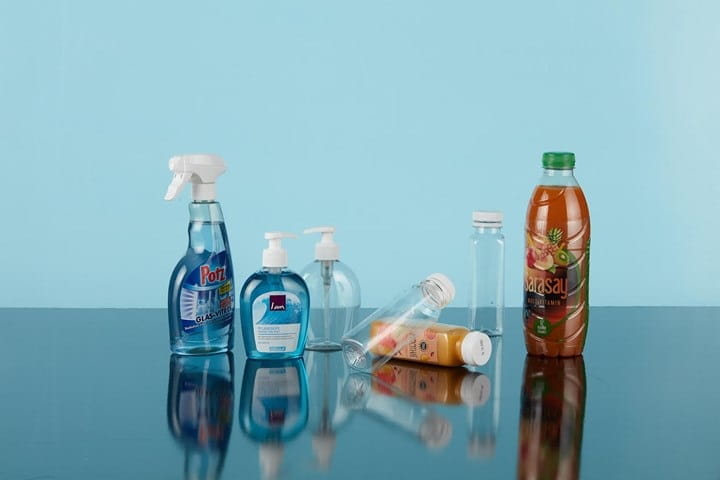
-Breathing new life into aramid fibres
Rejuvenation technology transforming post-industrial textile waste into sustainable circular fibres at the A+A Congress. Fibre Aramid Flexible Packaging
Teijin Aramid will highlight its new circularity collaboration with Purfi at the International A+A Congress from October 26-29 in Düsseldorf, Germany, in addition to showcasing its high-performance aramid solutions for protective materials, such as Teijinconex.
Purfi – a joint venture of Concordia Textiles and Purfi Global based in Waragem, Belgium – has developed a fibre rejuvenation technology which focuses on the strategic categorisation and classification of textile fabric waste, and the subsequent processing of these materials using patented and trade secret protected machinery and process techniques. The company distinguishes itself from traditional recycling which in most cases typically uses aggressive mechanical tearing, resulting in mostly downcycled end-products, or caustic chemicals and high resource costs, which produce an expensive end-product.
Purfi says it rejuvenation technology transforms post-industrial textile waste into truly sustainable circular fibres while maintaining an extremely low carbon footprint. It can also track raw materials from their origin at the manufacturer to the final product at the Purfi rejuvenation facility. Its collaboration with Teijin Aramid is based on a technology that regenerates pre and post-consumer aramid-based materials used in protective textiles to fibre level to an extremely high standard. The aim is for the rejuvenated fibres to be reused by Teijin Aramid and its value chain partners in the production of aramid-based protective textiles.
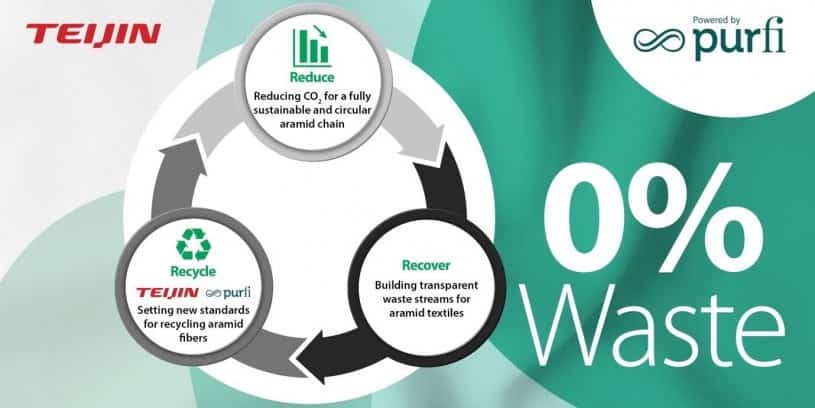
-£6.1m injection will see up to 50,000 tonnes of packaging waste recycled into construction products
Thanks to an injection of £6.1 million, including the help of PRN funding, the UK’s largest producer of damp-proof membranes is increasing its capacity for recycling ethylene-based plastics by 66 per cent.
Mercers, which is based in Bolton, transforms plastic packaging waste, such as HDPE and LDPE, into 100 per cent recycled damp-proof membrane. The new, high-tech equipment will allow it to recycle up to 50,000 tonnes of plastics each year, making sure that UK waste is dealt with responsibly in the UK.
Ben Richardson, procurement director at compliance scheme Valpak, a Reconomy Group company, which worked with Mercers to secure the funding through a long-term contract to supply PRNs, said: “This is exactly the kind of investment we need to ensure that UK packaging waste is securely recycled on these shores. As a manufacturer, as well as a recycling business, Mercers offers additional circularity by guaranteeing a market for the material recycled.
“Across the industry, we are seeing greater demand for UK-produced PRNs, while upcoming legislation, such as the Plastic Packaging Tax, is driving demand for recycled material. At Valpak, 65 per cent of our PRNs are sourced from UK reprocessors – compared with a UK market average of 48 per cent – and we support UK recycling wherever possible.”
Managing director at Mercers, Doug Mercer, said: “We see stories in the news about UK packaging waste being dumped in the Far East. This investment will help to make sure that UK waste packaging stays in the UK, where it can be properly recycled. The new machines are also more carbon-friendly. They provide a 30 per cent saving on the energy needed for recycling.”
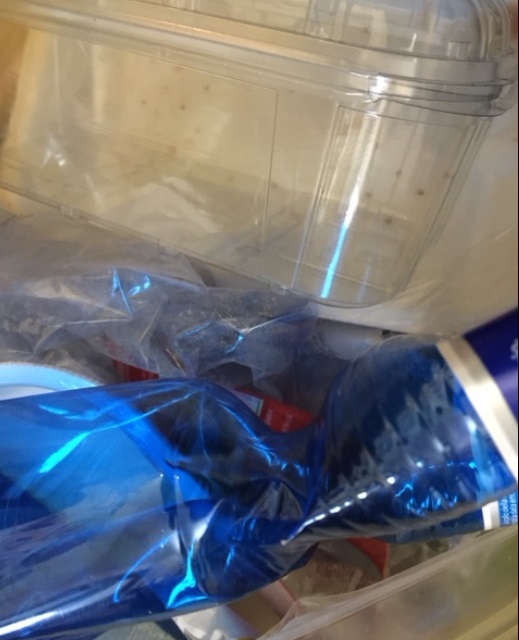
-Spain’s Fertiberia plans €1bn ammonia plant in Sweden
Fertiberia has signed a memorandum of understanding (MoU) with a Swedish regional government to build a €1.0bn green ammonia plant, the Spanish fertilizers producer said this week. Fibre Aramid Flexible Packaging
Total capital expenditure (capex) would stand at “over €1bn”, the company said.
The plant will be built in Lulea-Boden, in Norrbotten, Sweden’s northernmost county.
Fertiberia said it expects it to be operational by 2026.
Ammonia production would be 1,500 tonnes/day, Fertiberia said.
Considering ammonia plants normally undergo a one-month maintenance period every year, production capacity could come up to nearly 500,000 tonnes/year.
The plant will use electrolysis to use water and air as raw materials; the plant’s operations would be powered with wind and hydroelectric energy.
The project has been named ‘Green Wolverine’ and would employ 500 people once it is fully operational, the producer said.
The company said it had chosen the Norbotten county due to its “exceptional conditions” in energy production – according to Fertiberia, 100% of the county’s energy is provided by renewable sources.
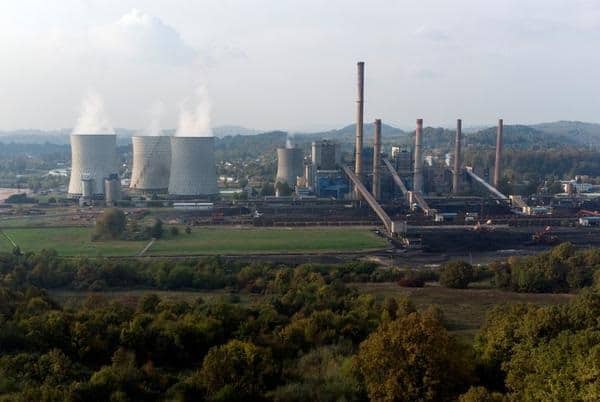
-C-P Flexible Packaging acquires Preferred Packaging
The deal expands C-P’s offerings in the meal solutions markets.
In a deal aimed at expanding its reach in the refrigerated and frozen prepared meal packaging systems markets, C-P Flexible Packaging (C-P) has acquired Sycamore Sales Inc., which is also known as Preferred Packaging.
The financial terms of the deal have not been disclosed.
Headquartered in Norcross, Ga., Preferred Packaging is a manufacturer of multilayer flexible films, thermoformed containers and a supplier of tray sealing equipment for meal solution providers and school systems. Fibre Aramid Flexible Packaging
C-P is a long-standing portfolio company of First Atlantic Capital, a New York based private equity firm.
“Preferred Packaging brings a variety of manufacturing capabilities including flexographic printing, laminating, slitting, mechanical macro perforating and micro laser perforating as well as thermoforming,” C-P officials said in an Oct. 21 news release. “Primary markets are prepared meals, value-added produce and processed meats. The company distributes nationally through a network of salespeople and independent sales representatives.”

-ENVIRONMENT Plastic pollution on course to double by 2030
Plastic pollution in oceans and other bodies of water continues to grow sharply and could more than double by 2030, according to an assessment released on Thursday by the UN Environment Programme (UNEP).
The report highlights dire consequences for health, the economy, biodiversity and the climate. It also says a drastic reduction in unnecessary, avoidable and problematic plastic, is crucial to addressing the global pollution crisis overall.
To help reduce plastic waste at the needed scale, it proposes an accelerated transition from fossil fuels to renewable energies, the removal of subsidies and a shift towards more circular approaches towards reduction. Fibre Aramid Flexible Packaging
Titled From Pollution to Solution: a global assessment of marine litter and plastic pollution, the report shows that there is a growing threat, across all ecosystems, from source to sea.
Solutions to hand
But it also shows that there is the know-how to reverse the mounting crisis, provided the political will is there, and urgent action is taken.
The document is being released 10 days ahead of the start of the crucial UN Climate Conference, COP26, stressing that plastics are a climate problem as well.
For example, in 2015, greenhouse gas emissions from plastics were 1.7 gigatonnes of CO2 equivalent; by 2050, they’re projected to increase to approximately 6.5 gigatonnes. That number represents 15 per cent of the whole global carbon budget – the amount of greenhouse gas that can be emitted, while still keeping warming within the Paris Agreement goals.
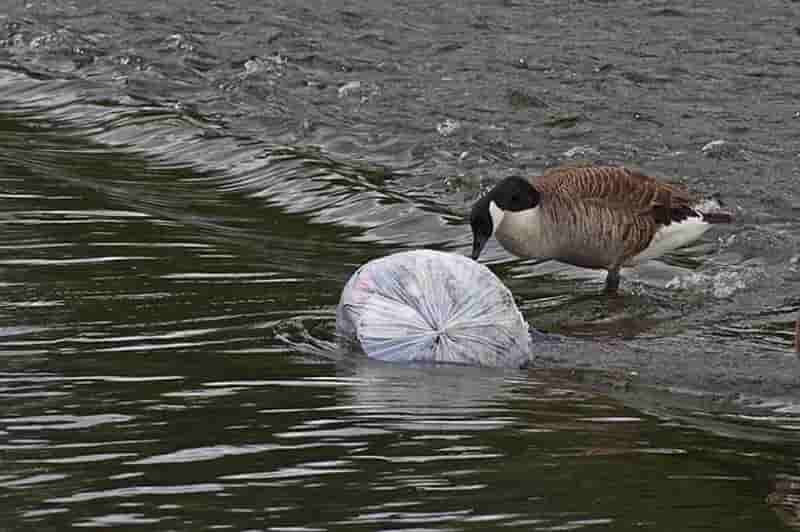
Due to the sharp rise in energy costs, more PET bottle chip plants in the European Union cut back output or shut down. In the fourth quarter, it is estimated that the bottle chip capacity shut down will reach 1.46 million tons, accounting for about 40% of the local total. Among them, Indorama plants based in Spain, Poland and the Netherlands all plan to turnaround in the fourth quarter, mainly from mid-late October to December, while Germany Equipolymers plans to turnaround in the first half of November. Local quote for PET bottle chip is reported to have risen to around 1400 euros per ton, equivalent to about $1630/mt. Fibre Aramid Flexible Packaging
In addition, Indorama Brazil 550kt/year PET bottle chip line announced force majeure near mid-August due to a fire, and has been shut ever since. At present, Lotte Chemical’s PET bottle chip units in South Korea are all closed, of which NO. 2 and 3 lines have been stopped for maintenance near the end of September and are expected to restart at the end of October; Line 1 is scheduled to restart around mid-November. TK Chemical’s 300kt/year PET bottle chip plant plans stop for maintenance in November. According to above statistics, the total capacity closure of overseas PET bottle chip plants is at 2.81 million tons, accounting for about 8% of the global total capacity. It is not ruled out that the output cutback or shutdown will continue to increase in the future if the energy crisis continuously deteriorates.
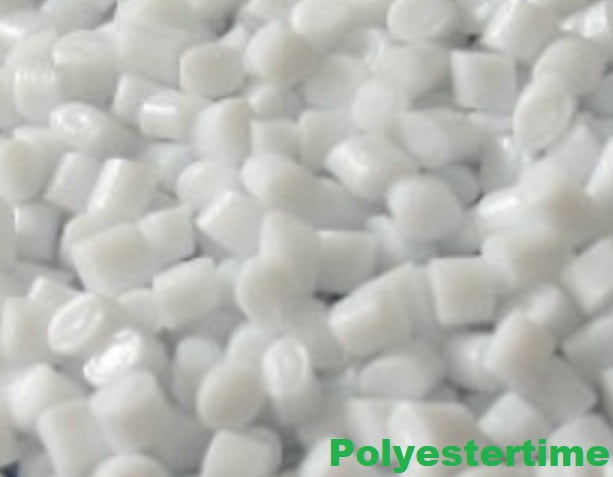
Fibre Aramid Flexible Packaging
